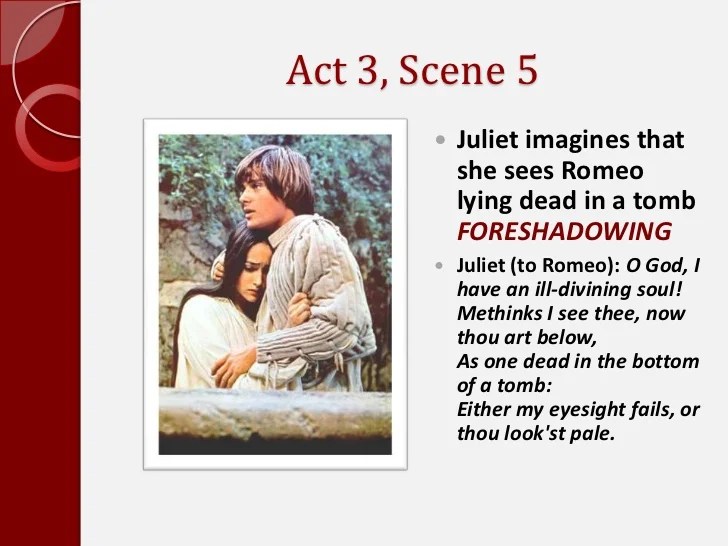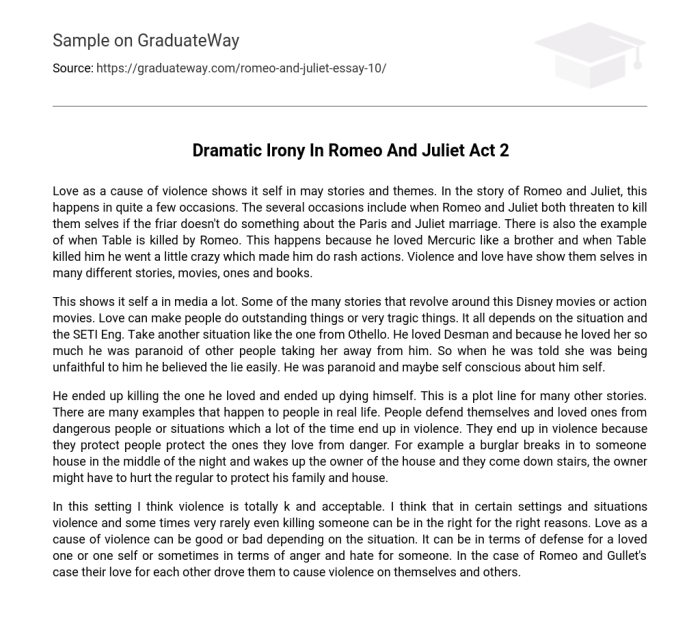Dramatic irony in romeo and juliet act 1 scene 5 – In Act 1, Scene 5 of Shakespeare’s timeless tragedy Romeo and Juliet, dramatic irony takes center stage, creating a profound and captivating theatrical experience. This pivotal scene sets the stage for the lovers’ star-crossed destiny, introducing a web of deception and hidden knowledge that drives the play’s tragic trajectory.
As the scene unfolds, the audience becomes privy to the secret identities of Romeo and Juliet, a fact unknown to the characters themselves. This disparity of knowledge creates a heightened sense of tension and anticipation, drawing the audience into the characters’ world and their impending doom.
Dramatic Irony in Romeo and Juliet Act 1 Scene 5
Act 1 Scene 5 of Romeo and Juliet showcases dramatic irony, where the audience is aware of information that the characters are not. This irony creates suspense and tension, enhancing the emotional impact of the scene.
Examples of Dramatic Irony
- The audience knows that Romeo and Juliet are in love, while the characters themselves are unaware of each other’s feelings.
- The audience is aware of the feud between the Montagues and Capulets, which foreshadows the tragic consequences of their love.
- The audience knows that Friar Laurence will eventually marry Romeo and Juliet, creating a sense of hope amidst the impending doom.
Significance of Dramatic Irony
Dramatic irony in this scene serves several purposes:
- Heightens the audience’s engagement and anticipation.
- Creates a sense of suspense and urgency.
- Highlights the characters’ innocence and vulnerability.
The Role of Friar Laurence: Dramatic Irony In Romeo And Juliet Act 1 Scene 5

Friar Laurence plays a pivotal role in the scene:
- He provides Romeo with advice and support after Romeo’s banishment.
- He secretly marries Romeo and Juliet, hoping to reconcile their families.
- He gives Juliet a potion that will make her appear dead, in an attempt to prevent her from being forced to marry Paris.
Friar Laurence’s Motivations and Actions
Friar Laurence’s actions are motivated by his desire to help the young lovers and bring peace to Verona. However, his well-intentioned plans ultimately lead to tragic consequences.
Impact of Friar Laurence’s Actions on the Plot
Friar Laurence’s actions have a profound impact on the plot:
- They contribute to the lovers’ secret marriage and subsequent deaths.
- They escalate the feud between the Montagues and Capulets.
- They highlight the Friar’s own tragic flaw of overreaching.
The Lovers’ Declarations

Romeo and Juliet’s declarations of love in this scene are passionate and intense:
- Romeo compares Juliet to the sun and stars.
- Juliet declares her love for Romeo, despite the consequences.
- They both vow to love each other forever.
Language and Imagery in Their Speeches
Their speeches are characterized by:
- Exaggerated language and metaphors.
- Hyperbole and similes.
- Imagery of light and darkness.
Significance of These Declarations
These declarations of love:
- Establish the depth and intensity of their feelings.
- Foretell the tragic consequences of their love.
- Highlight the power of love to transcend social barriers.
The Nurse’s Characterization

The Nurse is a complex and important character in this scene:
- She is Juliet’s confidante and helps her with her secret love for Romeo.
- She is a source of comic relief, providing humor amidst the tragedy.
- She is a loyal and devoted servant to the Capulet family.
The Nurse’s Role in the Scene, Dramatic irony in romeo and juliet act 1 scene 5
The Nurse plays a crucial role in:
- Facilitating Romeo and Juliet’s first meeting.
- Delivering messages between the lovers.
- Providing comic relief through her humorous remarks.
Significance of the Nurse as a Comic Relief Character
The Nurse’s comic relief provides a momentary escape from the tragedy, allowing the audience to experience a range of emotions.
FAQs
What is dramatic irony?
Dramatic irony occurs when the audience or reader possesses knowledge that the characters in a play or story do not, creating a sense of suspense and tension.
How is dramatic irony used in Act 1, Scene 5 of Romeo and Juliet?
In this scene, the audience knows that Romeo and Juliet are from feuding families, while the characters themselves are unaware of this fact, creating a sense of impending doom.
What is the significance of dramatic irony in this scene?
Dramatic irony heightens the tension and suspense of the scene, as the audience anticipates the tragic consequences of Romeo and Juliet’s forbidden love.